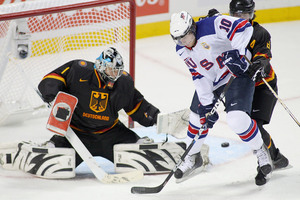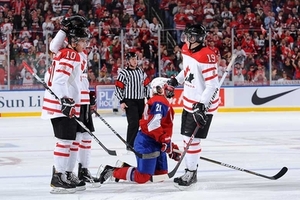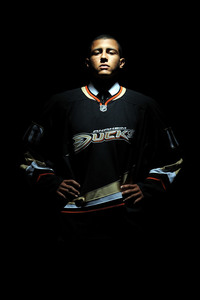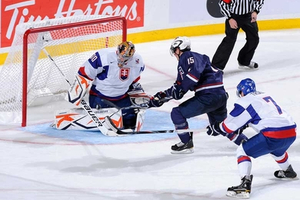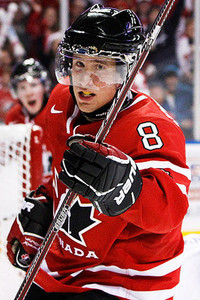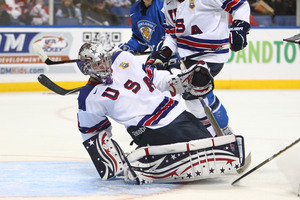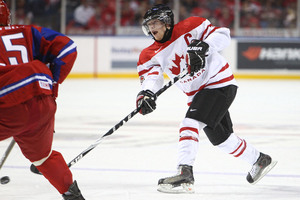Team USA recorded another easy win last night. Their defensive play was so efficient that the Germans could not get any offense going for the entire game, giving Jack Campbell his first shut out of tournament and back up goaltender Andy Iles about ten minutes of playing time to close out the third period. USA’s offense was as big of a threat as it has been throughout the WJC, and if it wasn’t for a spectacular game by Germany netminder Niklas Treutle, they would have scored three times as many goals as they did.
The word had it that Germany was a trap team that slowed the pace of games, clogged up the middle, and threw big hits. Their system worked for about five minutes. The United States’ speed took over, they found a way to maneuver through the neutral zone, and they came out hitting first. As they were adjusting, though, Jeremy Morin took a tripping penalty less than three minutes in. Though you always need to be sharp on a PK, odds were against Germany on converting as they were 1 for 16 on the tournament while the US was sporting a 100% kill rate. (Of course, this was only their third penalty in the tournament...)
The strong play and aggressive penalty kill by the Americans kept Germany out of their zone, holding them up at the blue line. They never got a shot on net. Shortly thereafter, Ryan Borque (pops Ray was in attendance, by the way) corralled a puck onto his stick to bring it into the offensive zone, but he rang the shot off the post. It started an offensive flurry during which time Treutle was fantastic. The Germans were already getting flustered and Tom Kuhnhackl was called for roughing.
The United States’ power play was like a well-oiled machine. They used an umbrella style, allowing the defenders on the weak side to pinch in easily. They dominated control for an entire minute, with Germany unable to get anywhere near the puck. After a quick clear, they came back in to do the same for the remainder of the PP. Although they didn’t score, they had three quality shots on net. Again, Treutle was a beast.
The Germans got their first big scoring chance on a two-on-one, but Campbell made the save easily and moved the puck up to his forwards who penetrated the offensive zone without too much difficulty. The US used a system that would prove successful throughout the night: get bodies low and out-work the defenders in front of the net while taking against-the-grain shots to the goalie’s stick side. Someone must have watched some tape on the kid.
Because of the constant onslaught, tempers started to flair and Benjamin Hufner of Team Germany took a roughing call. This time, the Americans were able to capitalize as they held in an attempt at clearing the puck along the boards, and Charlie Coyle and Kyle Palmieri rushed the net. Coyle faked a pass, pulled to his backhand and then used his forehand to send the puck over Treutle’s shoulder. Power play goal, US up one to zero.
Team USA came right back into the zone after the face off to set up what looked like a power play, even though it was 5-on-5. Emerson Etem landed a timely check along the boards, forcing a turnover which Jerry D’Amigo, who was the recipient of a scary hit last game, sent to the back of the net stick side from the circle. This put the Americans up 2-0.
Again letting their frustrations get the best of them, Marcel Ohmann took a hooking penalty, the third penalty of the game for the Germans. It was on a delayed call during which time, the US used as a 6-on-1 power play. They kept the puck in the offensive zone for a full minute before Germany was able to gain control for the whistle. They continued their strong pressure by staying on the attack for one and a half minutes of the power play before Germany was able to clear and kill off the penalty. At the end of the period, the US converted on one of their three power plays and netted an even strength goal for a score of 2-0.
In the second period, Germany came out a little stronger and was able to get some offense going around Campbell’s net. However, the Americans utilized their strong defense to prevent any real scoring opportunities. Taking the puck into Germany’s territory, Etem barely - and I mean barely - missed a wrap-around goal after having fooled Treutle to commit to his right, leaving a wide open net on the other side. Etem just wasn’t able to tuck it home because of the angle with which he came around the net.
Any time Germany was able to push the puck out of the zone, the US defenders were there to intercept and slide break out passes to their forwards, allowing easy entry into the offensive zone. Once there, they set up camp for long stretches of time. By mid-way through the second, the shots on net were 25-4 USA. Nick Bjugstad took such a pass and muscled his way into the high slot. He then passed the puck to Jon Merrill who recorded the third goal of the night for the United States.
Tempers really got going at this point, and a huge scrum started up around Germany’s net. D’Amigo was shoved down after the whistle by Germany’s Konrad Abeltshauser for which a few US players got a bit upset. D’Amigo got a shove in on Abeltshauser in retaliation, angering Bernhard Keil who then crosschecked D’Amigo for yet another penalty. In the scrum, an American player speared one of the German players with the end of his stick, yet there wasn’t a call on it. Big miss by the refs. Regardless, the US went on the power play and made good. Coyle and Palmieri did some nice criss-cross passing to get the puck to Chris Dreider who got his first of the tournament. Four-zero, US.
With six minutes left in the second, the shots registered at 35 to 5 in favor of Team USA. More frustration as Marius Mochel of Germany was called for slashing. The US didn’t score on that power play although they again kept the puck in the zone for over a minute, cycling it well. Germany got their best scoring opportunity of the game when Ohmann came screaming through center ice, barreling down on Campbell. However, Nick Leddy used his speed to catch up to him and made an amazing defensive play by getting his shoulder on Ohmann and forcing him off the puck at the last minute. Both skaters plowed into Campbell; fortunately, he hopped right back up and was actually checking in with Leddy to make sure he was okay.
In the final two minutes of the period, Germany put up some good shots on net and kept Campbell busy. But despite not getting much action, he was sharp and turned away the pucks fairly easily. The second period ended with 38 shots to 12 and the US on top 4-0.
Germany started the third with better defensive play and some aggression on offense. For a third time in the night, a multi-bodied scrum broke out. This time, both an American (Chris Brown) and a German (Jannik Woidtke) went to the box for matching roughing penalties. Neither team got much going on the 4-on-4, with the US registering the only shot. With 9:30 left, Campbell was pulled to give him some rest as Team USA is playing tonight. Iles stepped in and continued the strong play of his predecessor.
Borque took a stupid penalty (tripping) in the offensive zone and sent Germany on the power play with 3 mintues left. Still, the US kept the puck in Germany's zone; overwhelmed, Treutle tripped D’Amigo (the poor kid is getting worked over in this tournament; good thing he’s a tough bugger), but there wasn’t a call. The power play continued with Germany unable to get things set up as the US continued to take away the puck and get short-handed opportunities going. Neither team got a shot on goal, however. The game ended with the score remaining 4-0, United States.
Game notes:
- With the win, the US moved into first place in their group, one point ahead of Finland.
- The Americans remain 100% on the PK, having only taken 4 penalties in the tournament, the fewest of all teams. Canada is the next fewest with 9.
- Final shot count: 48-14, USA
- Emerson Etem received more boos during the first period although they were about half the volume and ended by the time the second period began. I’m going to withhold commentary on this at the risk of offending some Buffalonians.
- Ken Holland, the GM for the Red Wings, was interviewed during the second period. When asked about the value of the experience the Wings got by playing in the Winter Classic, he said (among other things), "It was in a great building." Yes, because the point of the Winter Classic isn’t that it’s played outdoors. Lord.
Players of the Game:
USA - Charlie Coyle (1 goal/1 assist)
Germany - Niklas Treutle (44 saves)
Next up: Switzerland, tonight (Dec. 31) at 6 pm MT/8 pm ET
